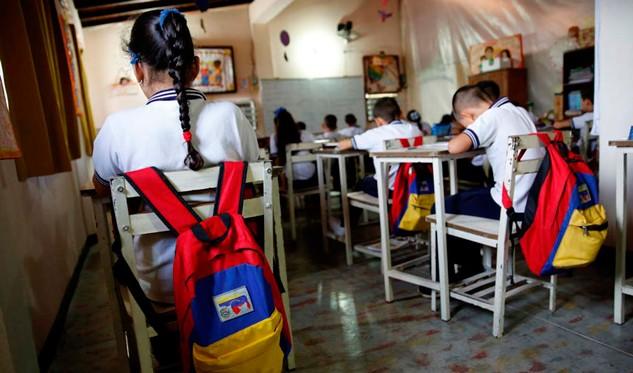Venezuela announces the return to face-to-face classes for the first time in 15 months
This week, for the first time since March 2020, some private schools in Venezuela organized the return to face-to-face classes for their students. It will be an initial experiment that will be repeated three times a week and with mandatory biosecurity measures. The Government of Nicolás Maduro has announced that from October the return to face-to-face classes in all educational centers will be progressive, in principle under the scheme of a week of flexible quarantine, in which school will be attended, and another of strict quarantine , with online classes.
The return to face-to-face classes in Venezuela is a decision that had already been announced, but was postponed due to the increase in infections. During these 15 months, since the outbreak of the pandemic, students have only received classes online while the authorities imposed severe restrictions on movement. The Government organized the plan Every family a school for distance education, which has been heavily criticized for its quality. Now the return is expected to be real. “Go preparing the students, classroom by classroom, section by section, high school by high school, university by university, with great firmness and seriousness with biosecurity measures,” Nicolás Maduro has requested in an official televised act.
The vice president, Delcy Rodríguez, assured that 80% of the country's teachers "are already fully vaccinated" to receive students under the mixed scheme. Encouraged by modest numbers of infections and deaths from covid, Maduro has even declared his interest in decreeing, for the first time, the months of November and December free of quarantine, with the aim of boosting the economic movement to some extent.
More informationLocked up without savings or provisions: this is how Venezuela survives in quarantineVenezuela: distance education with the worst Internet connection in the region
The government's intention to return to face-to-face classes has sparked criticism for the difficulty of carrying out the plan in some public education centers, which comprise 80% of education in Venezuela. "I don't think it's about refusing a call to face-to-face classes, but you have to see how the realities are in popular schools, in rural areas, the working conditions, the deficiencies of the current moment," says Nancy Hernández, leader of the NGO Fenasopadres, linked to teaching and education.
The increase in cases of covid in the capital and the structural problems of Venezuelan education at this time – teacher salary lags, teacher diaspora, school desertion and service problems in the schools themselves – are, according to what Hernández relates, some of the most important obstacles to return to normality.
Join EL PAÍS to follow all the news and read without limits.SubscribeFranklin Piccone, an active teacher in several secondary schools and a union leader, explains that "it is likely that there will be a blended educational process, with serious problems in the quality of teaching and lags in learning." “Venezuelan teachers are in a situation of technical unemployment: wages are starvation (eight dollars a month). Connectivity problems, student desertion and the diaspora have aggravated the problem of teaching”, he maintains.
“From a psycho-emotional point of view, going back to class is a necessity for students, especially for primary school students,” concedes Samuel Pérez, a sociologist and professor at the Central University of Venezuela, who adds: “You cannot have face-to-face classes without the majority of teachers and students being vaccinated. We also have a serious problem in the guild. The economic problems of the teachers complicate the return to classes”. The educator Leonardo Carvajal also believes that returning to face-to-face classes is a "laudable goal". The conditions for teaching in distance education. I have had to give up a lot in the quantity and frequency of my demands on the students”, he affirms.
Lila Vega, pediatrician and active member of the NGO Network of Mothers, Fathers and Representatives, assures that “the face-to-face return to classes cannot be postponed, but it has to meet some conditions. It has to be safe, that it respects all the protocols; It has to be flexible, because an increase in infections can send us home, and lastly, it has to be voluntary: there are still parents who are afraid to send their children to school and we have to respect that.”
Professor Carvajal predicts a return to classes "with ups and downs, disorganized and chaotic." “No one can be against the idea of going back to the classroom. The issue is to evaluate under what conditions this return will take place. I allow myself to doubt the statements made by Delcy Rodríguez about the numbers of vaccinated teachers”, she abounds.
Subscribe here to the EL PAÍS América newsletter and receive all the key information on current affairs in the region








